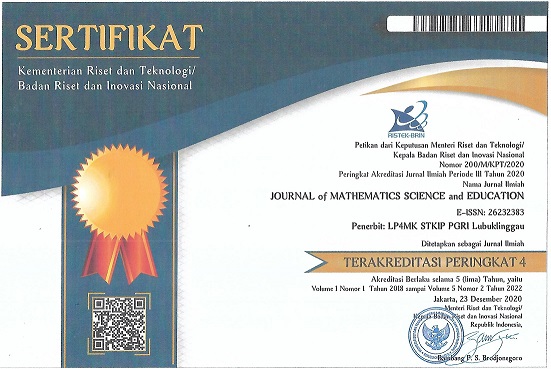ANALISIS MOTIVASI BELAJAR SISWA DALAM PEMBELAJARAN BANGUN RUANG KELAS VI MENGGUNAKAN MODEL PROBLEM BASED LEARNING
Abstract
The knowledge that is always being developed is knowledge about mathematics. Mathematics is a science that can train a person's thinking and logical abilities. Apart from that, research also focuses on other research in everyday life, especially the science of problem solving. Mathematics education is about connecting, designing, and creative learning. Sometimes studying mathematics in class can feel scary compared to other subjects, especially when it involves shapes. Abstract shapes have three-dimensional geometric concepts such as cubes, blocks, pyramids, prisms, cylinders and balls which are not easily understood with explanations or two-dimensional drawings. To overcome this problem, teachers should use teaching methods that increase students' conceptual understanding and make learning problem-based (PBL). The subject of this research is class VI of SD IT Uswatun Hasanah Padang Jaya. There are 29 students. The results of the research showed that 82.86% of students felt happy, so it was concluded that the use of PBL in mathematics education made students motivated in learning, especially class VI Bilal SD IT Uswatun Hasanah Padang Jaya.
References
Andriani & Rasto, R. 2019. Motivasi Belajar Sebagai Determinan Hasil Belajar Siswa. Jurnal Pendidikan Manajemen Perkantoran, 4 (1), 80. https://doi.org/10.17509/jpm.v4i1.14958
Anita, I. W. (2022). Meningkatkan Belajar Matematika Siswa SMP Kelas VII Pada Materi Himpunan dengan Menggunakan Pendekatan problem Based Learning. 5(4), hal1103–1112. https://doi.org/10.22460/jpmi.v5i4.1103-1112
Bell, S. (2010). Project-Based Learning for the 21st Century: Skills for the Future. *The Clearing House: A Journal of Educational Strategies, Issues and Ideas*, 83(2), 39-43.
Evi, T., & Indarini, E. (2021). Meta Analisis Efektivitas Model Problem Based Learning dan Problem Solving Terhadap Kemampuan Berpikir Kritis Mata Pelajaran Matematika Siswa Sekolah Dasar. Edukatif: Jurnal Ilmu Pendidikan, 3(2), 385395.
Fathurrohman, M. 2016. Model Pembelajaran Inovati, Alternatif Desain Pembelajaran yang Menyenangkan. Yogyakarta: Ar-Ruzz Media Group.
Gazali, R.Y. (2016). Pembelajaran Matematika yang Bermakna. Math Didactic: Jurnal Pendidikan matematika, 2 (3), 181-190.
Hendriana, H., Rohaeti, E. E., & Sumarmo, U. (2017). Hard Skills dan Soft Skills Matematika Siswa. Bandung: PT Refika Aditama.
Kompri. 2016. Motivasi Pembelajaran Perpsektif Guru dan Siswa. Bandung: Rosda Karya
Moleong, Lexi J. 2014. Metodologi Penelitian Kualitatif. Bandung: PT. Remaja Rosdakarya.
Safitri, Meilani. 2021 Model Pembelajaran Inovatif. Jakarta: Media Sains Indonesia,
Sardiman.AM 2016. Interaksi dan Motivasi Belajar Mengajar. Jakarta: Raja Grafindo Persada.
Santrock, J. W. (2018). *Educational Psychology*. McGraw-Hill.
Thomas, J. W. (2000). A review of research on project-based learning. *Autodesk Foundation*.
Wahyudi. (2016). The Development of Realistic Mathematics Education (RME) Model for the Improvement of Mathematics Learnings of Primary Teacher Education Program (PGSD) Students of Teacher Training and Education Faculty (FKIP) of Sebelas Maret University in Kebumen. In Proceeding of the International Conference on Teacher Training and Education (Vol. 2, No. 1, pp. 369-381).

This work is licensed under a Creative Commons Attribution-NonCommercial-ShareAlike 4.0 International License.

This work by Journal of Mathematics Science and Education is licensed under a Creative Commons Attribution-NonCommercial-ShareAlike 4.0 International License.
















